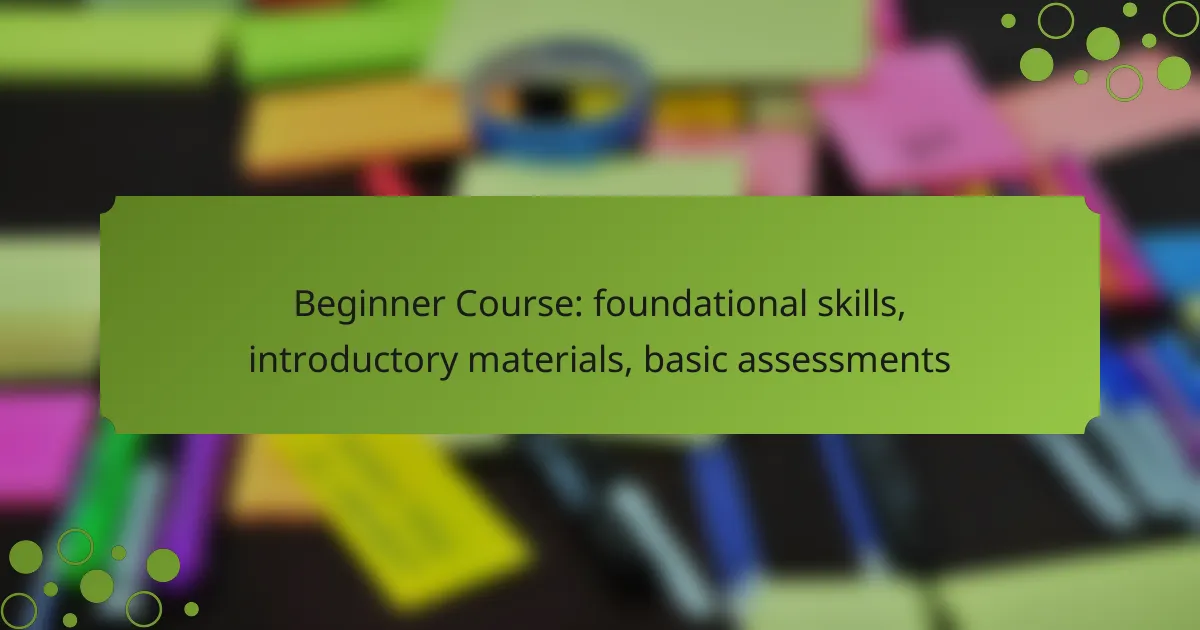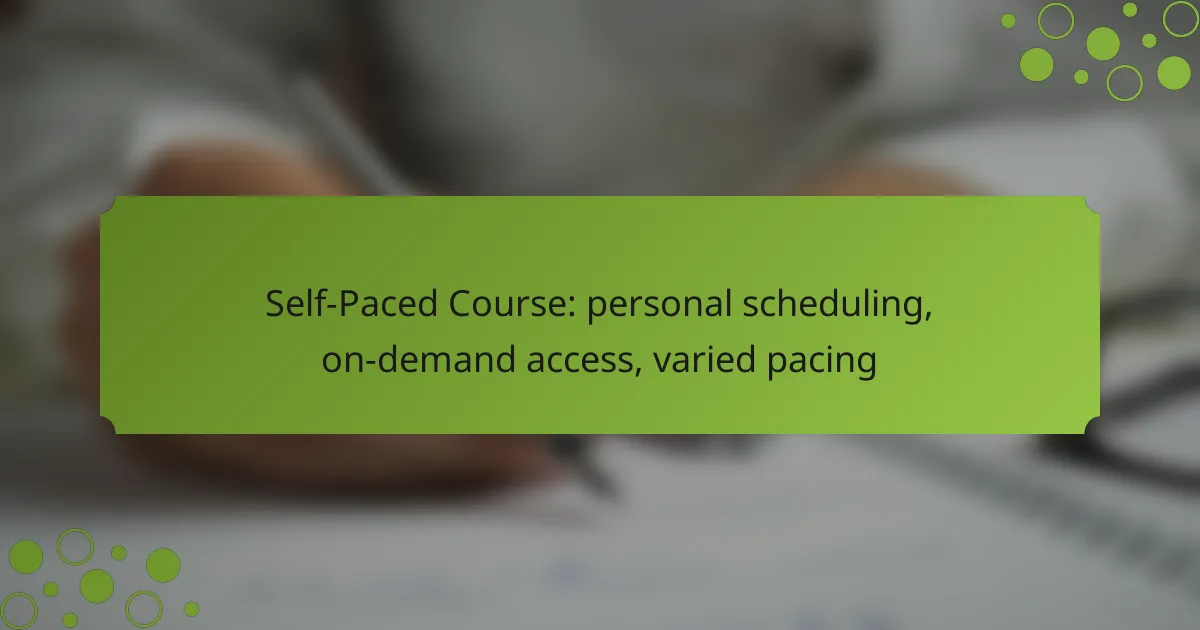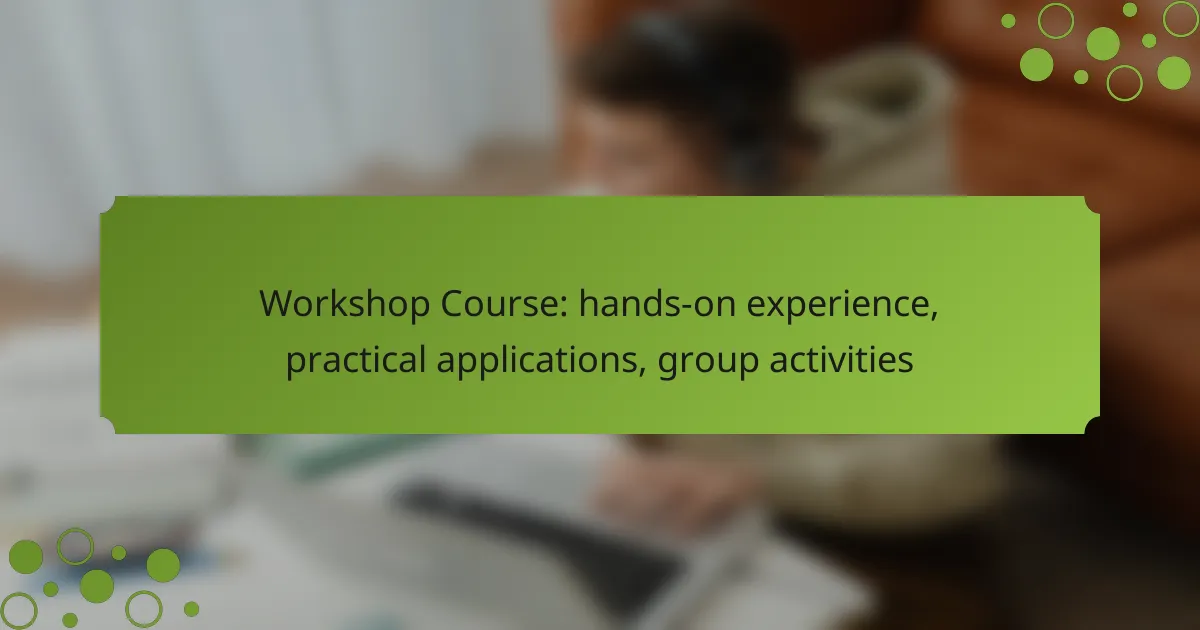This beginner course is designed to equip learners with essential foundational skills such as critical thinking, time management, and effective communication. Through a variety of introductory materials, including online platforms and interactive resources, participants will enhance their digital literacy and self-motivation. Additionally, learners will have the opportunity to assess their progress through self-assessment quizzes and feedback, ensuring a comprehensive understanding of their strengths and areas for growth.
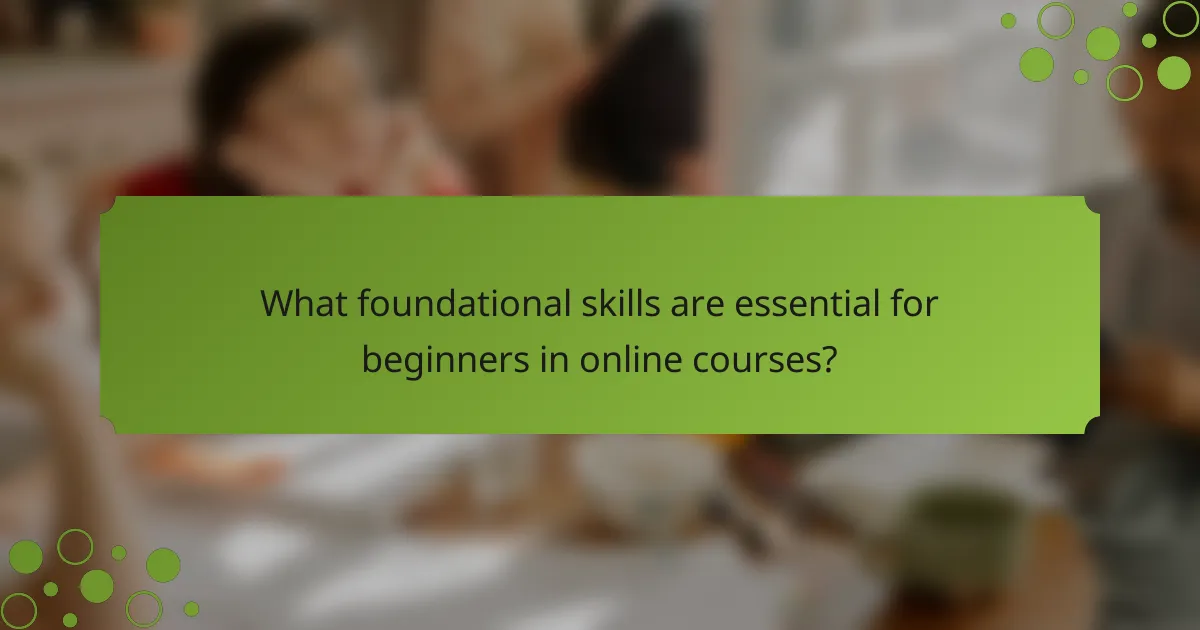
What foundational skills are essential for beginners in online courses?
Essential foundational skills for beginners in online courses include critical thinking, time management, basic digital literacy, effective communication, and self-motivation. These skills help learners navigate the online learning environment effectively and achieve their educational goals.
Critical thinking
Critical thinking involves analyzing information, evaluating evidence, and making reasoned decisions. For online learners, this skill is crucial for assessing course materials, distinguishing between credible sources, and forming well-supported arguments in discussions.
To enhance critical thinking, practice questioning assumptions and exploring different perspectives on topics. Engaging in online forums or study groups can also provide opportunities to challenge your viewpoints and refine your reasoning skills.
Time management
Time management is the ability to plan and control how you spend your time effectively. In an online course, this means setting a schedule that accommodates coursework, assignments, and personal commitments.
To improve time management, consider using tools like calendars or task management apps to track deadlines and prioritize tasks. Aim to allocate specific blocks of time each week for studying to create a consistent routine.
Basic digital literacy
Basic digital literacy refers to the skills needed to effectively use technology and navigate online platforms. This includes understanding how to use learning management systems, access course materials, and participate in online discussions.
To build digital literacy, familiarize yourself with common software and tools used in online education, such as video conferencing platforms and document-sharing services. Online tutorials can provide valuable guidance on using these technologies efficiently.
Effective communication
Effective communication is essential for collaborating with peers and instructors in an online setting. This skill encompasses both written and verbal communication, as well as the ability to listen actively and provide constructive feedback.
To enhance your communication skills, practice writing clear and concise messages in discussion forums and emails. Additionally, participating in group projects can help you develop your ability to convey ideas and collaborate with others.
Self-motivation
Self-motivation is the drive to pursue goals independently without external prompts. In online courses, this skill is vital for staying engaged and completing assignments on time.
To foster self-motivation, set personal goals for your learning journey and track your progress. Establishing a dedicated study space and minimizing distractions can also help you maintain focus and commitment to your coursework.

What introductory materials are recommended for beginners in Canada?
Beginners in Canada can benefit from a variety of introductory materials that cater to different learning styles. Recommended resources include online learning platforms, interactive eBooks, video tutorials, and webinars, all designed to build foundational skills effectively.
Online learning platforms
Online learning platforms like Coursera, Udemy, and Skillshare offer a wide range of courses tailored for beginners. These platforms often feature user-friendly interfaces and allow learners to progress at their own pace. Look for courses that provide certifications, as these can enhance your resume.
When selecting a platform, consider factors such as course reviews, instructor qualifications, and the availability of community support. Many platforms also offer free trials, so take advantage of these to find the best fit for your learning style.
Interactive eBooks
Interactive eBooks combine traditional reading with multimedia elements, making them engaging for beginners. These resources often include quizzes, videos, and interactive diagrams that reinforce learning. Popular platforms like Kindle and Apple Books provide access to a variety of interactive eBooks.
When choosing an interactive eBook, look for ones that align with your learning objectives and offer practical exercises. This hands-on approach can significantly enhance comprehension and retention of foundational concepts.
Video tutorials
Video tutorials are a popular choice for visual learners, offering step-by-step guidance on various topics. Platforms like YouTube and Vimeo host countless free tutorials that cover foundational skills across different subjects. Look for channels that specialize in beginner content to ensure clarity and relevance.
Consider creating a playlist of tutorials that build on each other, allowing for a structured learning path. Additionally, check for viewer ratings and comments to gauge the effectiveness of the tutorials before diving in.
Webinars and live sessions
Webinars and live sessions provide real-time interaction with instructors and peers, enhancing the learning experience. Many organizations and educational institutions in Canada offer free or low-cost webinars on foundational skills. These sessions often include Q&A segments, allowing for personalized feedback.
To make the most of webinars, prepare questions in advance and engage actively during the session. Additionally, take notes and review any provided materials afterward to reinforce what you’ve learned.
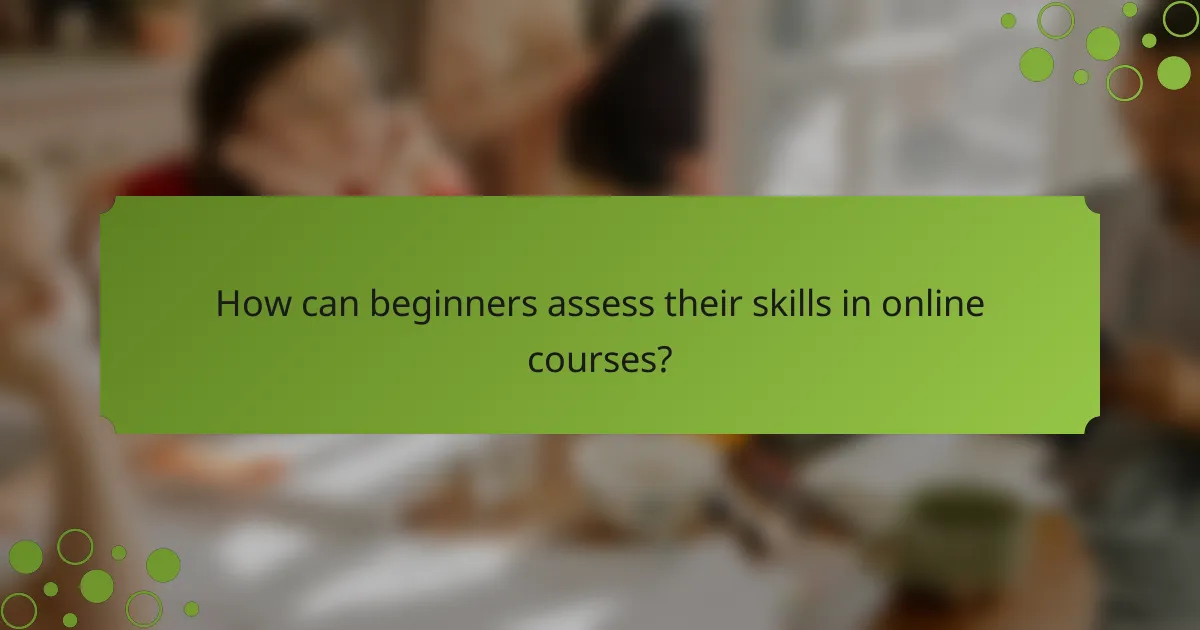
How can beginners assess their skills in online courses?
Beginners can assess their skills in online courses through various methods, including self-assessment quizzes, peer feedback, and instructor evaluations. Each approach offers unique insights into a learner’s strengths and areas for improvement.
Self-assessment quizzes
Self-assessment quizzes are tools that allow learners to evaluate their understanding of course material. These quizzes typically consist of multiple-choice or true/false questions that cover key concepts.
To effectively use self-assessment quizzes, beginners should take them after completing a module or unit. This helps identify knowledge gaps and reinforces learning. Aim for quizzes that provide immediate feedback to enhance understanding.
Peer feedback
Peer feedback involves receiving evaluations from fellow learners, which can provide different perspectives on one’s work. This method encourages collaboration and can highlight strengths that individuals may overlook.
To maximize the benefits of peer feedback, beginners should engage in group discussions or peer review sessions. Constructive criticism should be welcomed, as it can lead to significant improvements in skills and understanding.
Instructor evaluations
Instructor evaluations are assessments provided by course instructors, offering expert insights into a learner’s performance. These evaluations often include grades, comments, and suggestions for improvement.
Beginners should actively seek feedback from instructors after assignments or exams. Understanding the criteria used for evaluations can help learners focus on specific areas for growth and enhance their overall learning experience.

What prerequisites should beginners consider before enrolling?
Beginners should consider a few essential prerequisites before enrolling in a foundational course. Having basic computer skills, reliable internet access, and a commitment to learning will significantly enhance the learning experience and outcomes.
Basic computer skills
Basic computer skills are crucial for navigating online courses effectively. This includes familiarity with operating systems, file management, and using software applications like word processors and spreadsheets.
Beginners should be comfortable performing tasks such as creating and saving documents, using email, and participating in online discussions. If you find these tasks challenging, consider taking a short introductory course to build your confidence.
Internet access
Reliable internet access is essential for participating in online courses. A stable connection allows you to stream videos, download materials, and engage in live discussions without interruptions.
Check your internet speed to ensure it meets the minimum requirements for streaming and downloading course content. If you experience frequent connectivity issues, consider upgrading your plan or using a wired connection for more stability.
Commitment to learning
A strong commitment to learning is vital for success in any foundational course. This means setting aside regular time for study and being proactive in completing assignments and engaging with course materials.
Establish a study schedule that fits your lifestyle and stick to it. Avoid common pitfalls such as procrastination and distractions by creating a dedicated study space and minimizing interruptions during your learning sessions.

What are the best platforms for beginner online courses in Canada?
Some of the best platforms for beginner online courses in Canada include Coursera, Udemy, and Skillshare. These platforms offer a variety of foundational skills, introductory materials, and basic assessments tailored for new learners.
Coursera
Coursera partners with universities and organizations to provide a wide range of courses. Beginners can access foundational courses in various subjects, often for free or at a low cost. Courses typically include video lectures, readings, and quizzes to assess understanding.
When choosing a course on Coursera, look for those that offer a certificate upon completion, as this can enhance your resume. Many courses are self-paced, allowing you to learn at your convenience.
Udemy
Udemy features a vast library of courses across numerous topics, making it suitable for beginners. Courses are often created by industry professionals and include video lectures, downloadable resources, and quizzes. Prices vary, but frequent discounts make many courses affordable.
To maximize your learning, check course ratings and reviews before enrolling. Look for courses that offer lifetime access, so you can revisit materials as needed.
Skillshare
Skillshare focuses on creative skills and practical knowledge, making it ideal for beginners interested in design, writing, or entrepreneurship. Courses are project-based, encouraging hands-on learning. Membership provides access to thousands of courses for a monthly fee.
Consider starting with Skillshare’s free trial to explore different classes. Engage with the community through projects and feedback to enhance your learning experience.
